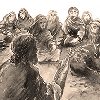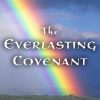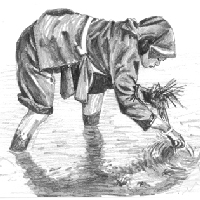
How can I believe in a God who throws good people into Hell just because they are not Christians?

Has anyone ever asked you this question? Many sincere people wonder. Of course, you could pull a pat answer from your theological quiver and say, “No one is good.” And there is some truth to that, for truly all have sinned and fall short of the glory of God. But does that mean that, say, a Chinese peasant who worked hard all her life caring for her family, remaining faithfully married for 50 years, would be condemned by God to the same eternal destiny as Adolf Hitler who murdered six million Jews?
Of course He does no such thing, not if He is the God the Bible describes, the God whom Abraham knew. This was Abraham’s confidence:
Far be it from You to do such a thing, to slay the righteous with the wicked, so that the righteous and the wicked are treated alike. Far be it from You! Shall not the Judge of all the earth deal justly?
(Genesis 18:25)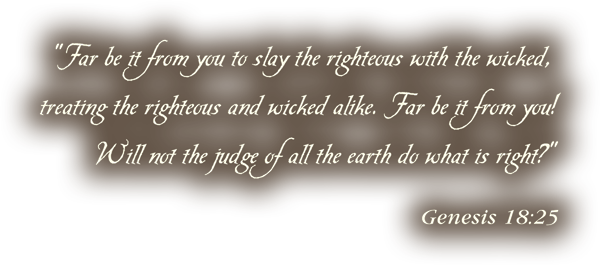
Pay careful attention to the wording of Abraham’s plea: he appealed to God on behalf of the righteous in Sodom. Were there any people in Sodom who were justified by grace through faith so as to be counted righteous in the way that Abraham was? Even Abraham’s nephew Lot had parted company with him long before Abraham’s faith was reckoned to him as righteousness.1Gen 13:11; 15:6 Lot had no part in the covenants with Abraham. So how could there be any righteous men in Sodom? Was Abraham just naïve or deluded?
No! God’s response confirmed Abraham’s understanding — He sent His angels to rescue Lot, who turned out to be the only righteous man in Sodom, before He destroyed that wicked city. Lot was not a religious man, but according to Abraham and the apostle Peter, he was a righteous man:
…and if He rescued righteous Lot, oppressed by the sensual conduct of unprincipled men (for by what he saw and heard that righteous man, while living among them, felt his righteous soul tormented day after day with their lawless deeds), then the Lord knows how to rescue the godly from temptation, and to keep the unrighteous under punishment for the day of judgment… (2 Peter 2:7-9)
The apostle Peter, who had once thought God only accepted Jews, had come to understand how God really was:
I most certainly understand now that God is not one to show partiality, but in every nation the man who fears Him and does what is right, is accepted by Him. (Acts 10:34-35)
The teaching that Christians are going to heaven and everyone else is going to eternal hell slanders God’s character. It denies His great love for men and women who struggle to live by their conscience, not doing things that ruin people’s lives.2Revelation 21:8; 22:15
What most Christians don’t understand is that there are three eternal destinies, not two. There are three categories of men,3Revelation 22:11 and three places prepared for them to spend eternity based on God’s just judgment.4Hebrews 9:27; Revelation 20:12-13 Certainly there is a place of eternal torment for those who cast off the restraint of conscience and gave themselves to doing things that God hates. This is the first category of man — the Unjust and Filthy of Revelation 22:11.
And certainly there is an eternal reward for those who repented of their sin and gave up everything to follow Yahshua the Messiah, the Son of God, in obedience to the gospel.5Mark 10:28-30; Luke 14:26-33 This is the third category of man, the Holy of Revelation 22:11. The Bible says they will rule with Messiah forever over the nations.6Revelation 2:26-27 But who are the people of these nations? They are not the Unjust and Filthy of the first category, for they spend eternity in the Lake of Fire.7Matthew 25:41; Revelation 20:10-15 Nor are they the Holy of the third category, for they comprise the holy city8Revelation 21:9-27 as those who rule with Messiah over the nations.
The simple truth is that God recognizes another category of people that most Christians do not recognize: those who are Righteous according to the standard their Creator put into their conscience. This is the second category of Revelation 22:11, and they also have an eternal reward9Revelation 22:12 awaiting them after the Judgment — the eternal kingdom of the nations10Matthew 25:34 over which Messiah and His holy ones will rule with perfect love and justice.11Revelation 5:10
The Bible says that it is appointed for men to die once (not twice), and then face judgment.12Hebrews 9:27 The first death is the wages of sin,13Romans 6:23 the just sentence due to Adam14Genesis 2:17 and all who sinned after him. But that first death is not eternal — it comes to an end and then there must be a judgment to determine, for each person, whether he or she is worthy of a second death or a second life. We are not talking about reincarnation here. We are talking about the words of our Master Yahshua, the Son of God, who said:
Do not be surprised at this; the time is coming when all the dead in the graves will hear His voice, and they will come out of their graves: those who have done good will rise and live, and those who have done evil will rise and be condemned.
(John 5:28-29)
The reason He said, “Do not be surprised…” is that He knew that the religious people of that day (like Christians today) would be surprised to hear that all men had the possibility of being granted a second, eternal life based on their deeds (not on their religion). In this passage Yahshua presents the first category (“those who have done evil”) and the second category (“those who have done good”) of Revelation 22:11, in contrast to the third category which He described a few verses before:
I tell you the truth, whoever hears My word and believes Him who sent me has eternal life and does not come into judgment, but has passed out of death into life. (John 5:24)
Those who respond to His word by totally entrusting their lives to Him15see article “The Holy” need not even taste death,16John 8:51 for He paid for their sins by His own death. They are not included in the judgment of John 5:29. The eternal life that they receive is a free gift of His grace, and is not based on their own works. But the judgment of John 5:29 is based on how each person who never heard the voice of the Son of God this side of the grave17Those who do hear His voice but reject Him are also excluded from this judgment, for they are already condemned, John 3:18 lived his or her life. Concerning this judgment, Yahshua said:
Behold, I am coming quickly, and My reward is with Me, to render to every man according to what he has done.
(Revelation 22:12)
To the Unjust and Filthy, a second death; to the Righteous, a second life; to the Holy, to rule with Him over the Righteous nations,18Revelation 22:1-5 who ultimately fill the whole universe with His image.19Ephesians 3:21
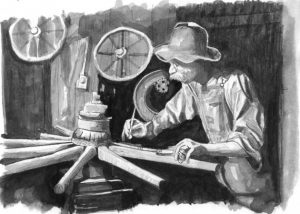
Who are the Righteous?
Every human being is born into the category of the Righteous, because each one is created in the image of the Creator20Genesis 9:6; Ecclesiates 7:29 with an inborn, instinctive knowledge of Him. Although all men come forth from the fallen seed of Adam, inheriting the iniquities of their fathers, they are born with a conscience and the ability to obey it. This is clear from the way God spoke to Cain when he was angry toward his brother Abel:
Why are you angry, and why has your countenance fallen? If you do well, will you not be accepted? And if you do not do well, sin is lurking at the door; its desire is for you, but you must master it. (Genesis 4:6-7)
God expected Cain to master, to overcome the temptation to commit such a sin. It was within Cain’s power to resist the urge to murder his brother; otherwise God was unjust to demand it of him. If Cain did well (overcame this kind of sin), God would accept him, as God will always accept those who do what is good.21Acts 10:34-35
Of course, some will argue that all have sinned and fall short of the glory of God.22Romans 3:23 This is quite true. All have sinned, but not all have sinned to the degree that merits eternal punishment. The Bible is very specific about the kind of people who are worthy of the Lake of Fire. Examples are cowards, murderers, sorcerers, fornicators, adulterers, sodomites, idolaters, thieves, swindlers, drunkards, those obsessed with greed, and those who love and practice lying.231 Corinthians 6:9-10; Revelation 21:8; 22:15 God does not account all sin the same. He does not equate the murderer with the man who worked hard all his life, was faithful to his wife, and ruled well over his family, disciplining his children.24Hebrews 12:7-9
Cain crossed over a line when he murdered his brother25John 3:12-15 — from the category of the Righteous to the category of the Unjust and Filthy. He chose to destroy his brother, and the resulting guilt was more than he could bear,26Genesis 4:13 more than he could pay for by his own death. And that is what distinguishes the sins of the Unjust and Filthy from those of the Righteous — they are the sins that destroy people’s lives. Men and women who practice such sins fully deserve their eternal destiny in the Lake of Fire.27Revelation 21:8
Since Adam fell, every man has been born with an inclination to sin — a selfish bent — but not an inclination to silence his conscience. It is normal to value your conscience, not to despise it. Your conscience is a precious gift from a loving Creator who desires to keep you from destroying yourself and your fellow man. It is God’s vice-regent in the human heart, His voice that upholds the absolute standard of right and wrong,28Romans 2:14-16 and His book that records every violation of that standard until the day of judgment.29Rev 20:12 Those who suppress this voice store up wrath for themselves.30Romans 1:18 Eventually they succeed in silencing their conscience as God turns them over to their depraved minds31Romans 1:28-32 and removes their names from the Book of Life.32 But men and women who heed the voice of their conscience will find mercy on the day of judgment. Their names remain in the Book of Life that records those who are worthy of a second life.32Revelation 20:15
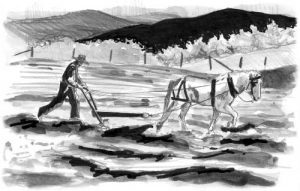
The Everlasting Covenant
What exactly is the voice of conscience saying? What is this instinctive knowledge that God has inscribed on every human heart? It is the terms of an Everlasting Covenant that God made with Adam and Eve after the Fall, the boundaries of the conscience that would keep them and their offspring from the sins that would take them to the second death:
To the woman He said, “I will greatly multiply your pain in childbirth; in pain you shall bring forth children; yet your desire shall be for your husband, and he shall rule over you.”
Then to Adam He said, “Because you have listened to the voice of your wife, and have eaten from the tree about which I commanded you, saying, ‘You shall not eat from it,’ cursed is the ground for your sake. In toil you shall eat of it all the days of your life. Both thorns and thistles it shall grow for you, and you shall eat the plants of the field. By the sweat of your brow you shall eat bread, till you return to the ground, because from it you were taken; for you are dust, and to dust you shall return.” (Genesis 3:16-19)
These verses convey the essence of God’s absolute moral standard for men and women. The woman is to desire her husband and give herself to bearing his children, not trying to escape the suffering of childbirth or the responsibility of caring for them. This creates a strong bond between the woman and her children, who grow up respecting her. Her husband’s love and respect for her also increases as he watches her go through the pain of childbirth.
The woman is to willingly submit to her husband’s authority over her. The man is to lovingly rule over his wife, appreciating her desire for him and being faithful to her. He is to work hard to provide for his family, living off the sweat of his own brow, not trying to escape the suffering or the responsibility of being their provider. And they love and respect him for this.
There is no room within these boundaries for sexual relationships outside of the life-long covenant of marriage between a man and a woman. There is no room for the selfishness that usually motivates the choice to not bear children. There is no room for the wife to dominate or manipulate her husband. There is no room for the husband to be passive or lazy, or to be harsh or tyrannical. But there is much room for mutual love and care, faithfulness and diligence, loyalty and patience, kindness and warmth, endurance and fruitfulness. There is much room for happy, secure, righteous children who grow up to continue in the footsteps of their parents, within the boundaries of this Everlasting Covenant of conscience.
Tragically, beginning with Cain, there were many who forsook this covenant. By the time of Noah’s generation, wickedness was so great that God was grieved that He had made man.34 But He took hope in Noah’s family, who still held to the Everlasting Covenant. After the great flood He added to the covenant:
And God blessed Noah and his sons and said to them, “Be fruitful and multiply, and fill the earth… And surely I will require your lifeblood; from every beast I will require it. And from every man, from every man’s brother I will require the life of man. Whoever sheds man’s blood, by man his blood shall be shed, for in the image of God He made man. And as for you, be fruitful and multiply; populate the earth abundantly and multiply in it.”
(Genesis 9:1-7)
This includes a provision for human government to punish those who destroy human lives, which Israel received as law (as all nations will in which righteous men prevail):
If anyone kills a person, the murderer shall be put to death at the evidence of witnesses, but no person shall be put to death on the testimony of one witness. Moreover, you shall not take ransom for the life of a murderer who is guilty of death, but he shall surely be put to death… So you shall not pollute the land in which you are; for blood pollutes the land and no atonement can be made for the land for the blood that is shed on it, except by the blood of him who shed it.
(Numbers 35:30-33)
All good people will uphold this standard (even with their vote), for they value the image of God in their fellow man. Not only will they not murder,35 but they will not knowingly do anything to ruin another person’s life.36 Still, as in the days of Noah, most people today do not uphold this Everlasting Covenant, and the tragic results are plain to see, as the prophet Isaiah foretold:
The earth is polluted by its inhabitants, for they transgressed laws, violated statutes, broke the Everlasting Covenant. Therefore, a curse devours the earth…
(Isaiah 24:5,6)
The Judgment of the Sheep and the Goats
Considering the sad state of humanity in general, what is the heart of a just and righteous God toward courageous men and women who suffer to keep a good conscience by upholding the Everlasting Covenant, respecting His image in their fellow man by showing care, hospitality, and compassion? Will He condemn them along with the cowardly, self-seeking, greedy, deceitful, and sexually filthy people who defile this good earth? Far be it from Him to do such a thing — to treat the righteous and the wicked alike! 37 On the contrary…
… When the Son of Man comes in His glory, and all the angels with Him, then He will sit on His glorious throne. And all the people of the nations will be gathered before Him, and He will separate them from one another, as the shepherd separates the sheep from the goats; and He will put the sheep on His right, and the goats on the left.
Then the King will say to those on His right, “Come, you who are blessed of My Father, inherit the kingdom prepared for you from the foundation of the world. For I was hungry, and you gave Me something to eat. I was thirsty, and you gave Me drink. I was a stranger, and you invited Me in; naked, and you clothed Me. I was sick, and you visited Me. I was in prison, and you came to Me.”
Then the righteous will answer Him, saying, “Lord, when did we see You hungry, and feed You, or thirsty, and give You drink? And when did we see You a stranger, and invite You in, or naked, and clothe You? And when did we see You sick, or in prison, and come to You?”
And the King will answer and say to them, “Truly I say to you, to the extent that you did it to one of these brothers of Mine, even the least of them, you did it to Me.”
(Matthew 25:31-40)
Who are these righteous people whom Yahshua calls sheep? It is clear that they are not disciples for at least three reasons:
1) They are justified by their works (while disciples are saved by the grace of God because of their faith (trust) in Him);38
2) They were not aware that by loving Yahshua’s brothers they were loving Him (while disciples know they are loving their Master by loving their brothers);39
3) They are contrasted to “these brothers of mine” in verse 40.
These people whom Yahshua calls sheep were unaware that the people to whom they showed hospitality were especially important. Their motive was not selfish gain. Their conscience told them to honor the image of God in their fellow man,40 and they were inclined to obey the voice of their conscience. They were consistent at it. That is why Yahshua called them sheep — they sensed their need of a shepherd, which was their conscience. And the Chief Shepherd will welcome them into the kingdom prepared for them — the Eternal Kingdom of the Nations, over which Yahshua and His brothers41 will rule.42
As for the goats, who had no use for a shepherd, there is a place prepared for them, too:
Then He will also say to those on His left, “Depart from Me, accursed ones, into the eternal fire which has been prepared for the devil and his angels; for I was hungry, and you gave Me nothing to eat; I was thirsty, and you gave Me nothing to drink; I was a stranger, and you did not invite Me in; naked, and you did not clothe Me; sick, and in prison, and you did not visit Me.”
Then they themselves also will answer, saying, “Lord, when did we see You hungry, or thirsty, or a stranger, or naked, or sick, or in prison, and did not take care of You?”
Then He will answer them, saying, “Truly I say to you, to the extent that you did not do it to one of the least of these, you did not do it to Me.” And these will go away into eternal punishment, but the righteous into eternal life.
(Matthew 25:41-46)
The three categories of man are clearly distinguished in this passage:
1) The Wicked who live only for themselves, in callous disregard of their fellow man, silencing their conscience to gratify their own desires (the Lake of Fire will be their eternal destiny43);
2) The Righteous who recognize and honor the image of God in their fellow man, keeping a good conscience even at cost to themselves (an eternal kingdom has been prepared for them44);
3) Yahshua’s brothers, the Holy, who have utterly forsaken their own lives and live only for Him who died and rose again on their behalf (the Holy City has been prepared for them45).
Perhaps you are not used to thinking in terms of three categories and three eternal destinies, yet the truth of these words registers in your conscience — that is, if you have the heart of Abraham, the friend of God. Otherwise, what confidence can you have that you know the God of Abraham? Do you believe in a God who throws good people into hell?
Scriptural References and Other Footnotes



